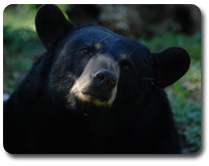
Black Bear Management Activities

Issue/Problem Statement
Bear in Nova Scotia are not only a prized big game species by hunters, and of commercial value to trappers, but also cause considerable damage and property loss to sectors of the agricultural community. Management responsibilities include providing an appropriate level of harvest through hunting and snaring and reducing nuisance/damage incidence when possible.
Objective
To maintain a healthy population of bear throughout their natural habitat, permitting a safe and humane harvest through hunting and snaring (sustainable level) and assist the public in minimizing property damage and nuisance problems.
Methods
By means of hunter report cards and the collection of a tooth (for age determination) statistics are kept respecting hunter success rates and snare nights required to take a bear. Problem bear situations are investigated by NR&R staff and details of these occurrences are recorded to monitor trends, problem areas and suggested solutions to specific concerns. Trends in these data are used to determine relative abundance of the species. These data can now be plotted on the Geographical Information System.
Partners
Holders of Bear Hunting and Bear Snaring Licenses and Regional Services Staff.
Project Dates and Duration
Ongoing
Progress to Date
Both hunting and bear snaring license sales have increased significantly during 1994 and 1995. In 1996, sales dropped slightly. Non-resident license sales increased form 37 in 1994 to 81 in 1995 and 102 in 1996. Although lower than in 1994 and 1995, hunter success rate remained high at 29.3% in 1996. Snaring success rate by trappers dropped from its high of 60.8% in 1994 to 33.3% in 1995 and 37% in 1996. Total number of bear taken through hunting and snaring during the fall of 1996 was 291. Non-hunting related bear deaths totalled 30. Nuisance bear complaints were 198 as compared to 243 in 1995. During 1996 a new regulation was introduced that now requires all bear gallbladders to be sealed with a numbered, permanent locking seal, prior to being sold within or exported from Nova Scotia. As recommended by World Wildlife Fund, this program should discourage illegal trade of galls, and provide a better means of monitoring/tracking the trade in bear galls.
Reporting
On-going - annual summary - February
Management Recommendations
Management Recommendations: Continue current practices of hunting and snaring. Hunter and Snaring report cards should be changed to accommodate the collection of kill location. This should be verified and recorded by NR&R staff when hunter brings in skull for tooth extraction.
Final Report: NA
Completion Date: Ongoing: annual